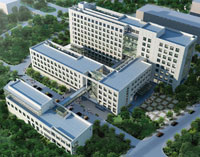
The Institute of Microbiology of the Chinese Academy of Sciences (IMCAS) is the largest microbiological research institution in China. It was founded on December 3, 1958, through the merger of the Institute of Applied Mycology and the Beijing Laboratories of Microbiology, both of which were affiliated to the Chinese Academy of Sciences (CAS). IMCAS was initially located in Zhongguancun, Haidian District, Beijing. In early 2007, the major part of the Institute was relocated to the CAS Life Science Park near the Olympic Village in Chaoyang District, Beijing. After over 50 years of development, it has become the nation's largest comprehensive research institution of microbiological science.
In the first 18 years from 1958 to 1976, IMCAS had eight research divisions covering the following disciplines: mycology, virology, physiology and biochemistry, biophysics, genetics, agricultural microbiology, industrial microbiology and geomicrobiology. During that period of time, great efforts were made to survey microbial resources and to study microbial metabolisms and genetic variations. A large number of microbial strains were found and improved for use in fermentation industries, agriculture and geological survey.
In 1978, in accordance with the strategic restructuring of CAS, IMCAS underwent institutional reorganization and set up eight divisions, i.e., divisions of fungal classification, bacterial classification, virology, microbial ecology, microbial metabolism, microbial enzymology, microbial genetics and microbial strain preservation. At the same time, new research support systems, including a fermentation pilot plant, a core facility, a radiation safety laboratory and an information center, were set up. In the following two decades, IMCAS made great strides in both basic and applied research, which were represented by a large number of scientific achievements of great significance to economic and social development.
In 1998, the CAS Knowledge Innovation Project was officially launched. Upon approval by CAS, IMCAS entered the Project on August 15, 2001, marking the beginning of a new phase in its history. With microbial resources, molecular microbiology and microbial biotechnology as three main areas of research, the Institute reshuffled its research divisions to establish a research center for microbial resources, a research center for molecular microbiology and a research center for microbial biotechnology. In 2004, IMCAS recognized microbial resources, industrial microbiology and pathogenic microbiology as its three areas of research, and set up nine research centers in the three areas. These include research centers for microbial resources, extremophiles, energy and industrial biotechnology, microbial metabolic engineering, environmental biotechnology, agricultural biotechnology, molecular virology and molecular immunology, and a joint research center for microbial genomics.
Since 2008, the Institute has endeavored to reorganize research and development activities into an innovative value chain with a biological resource center, a scientific research system and a technology transfer and transformation center as three interconnected units, and to carry out basic, strategic and prospective research in the areas of microbial resources, microbial biotechnology and pathogenic microbiology and immunology to meet national needs in industrial upgrading, agricultural development, human health, environmental protection, etc. At present, the scientific research system of IMCAS is comprised of five laboratories: State Key Laboratory of Microbial Resources, State Key Laboratory of Plant Genomics (jointly set up by IMCAS and the Institute of Genetics and Developmental Biology, CAS), State Key Laboratory of Mycology, CAS Key Laboratory of Pathogenic Microbiology and Immunology, and CAS Key Laboratory of Microbial Physiological and Metabolic Engineering.
IMCAS owns the largest fungal herbarium in Asia with nearly 500,000 specimens and the largest microbiological culture collection in China with more than 41,000 strains. In addition, it possesses a microbiological information center, a core facility, a Biosafety Level-3 laboratory and other supporting platforms. It also has a specialized library with more than 50,000 books/journals and an electronic library with more than 20,000 e-books and 9,000 e-journals in Chinese or English. Three national academic societies, i.e., Chinese Society of Microbiology (CSM), Chinese Mycology Society and Chinese Society of Biotechnology (CSBT), are currently affiliated to IMCAS. IMCAS publish the following academic journals in conjunction with these societies: Acta Microbiologica Sinica, Microbiology China, Mycosystem and Chinese Journal of Biological Engineering (in Chinese and English).
The Institute also attaches great importance to cooperation with international scientific community and industries. Since 2008, IMCAS implemented 50 international cooperative projects and 40 talent recruitment and international exchange projects. In 2010, IMCAS was elected to be the host institute of the World Data Center for Microorganisms. In 2012, IMCAS cooperated with Royal Holloway, University of London and launched Fungal Names, an international fungal names registration website and a Chinese fungal species database. In March 2013, the CAS-TWAS Biotechnology Center of Excellence was established at IMCAS. Each year, it organizes several international meetings in microbiology to further promote communication and exchanges in the international community.
IMCAS employs more than 490 staff members, of whom more than 288 are researchers including seven CAS academicians. There are 467 graduate students at IMCAS.
Through over five decades of unflagging efforts, IMCAS has developed into a comprehensive microbiological research institution with rich heritage, great strength and international reputation.
